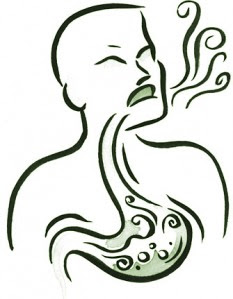 Heartburn is a painful condition involving the upper digestive system, not the heart itself. The reason why some people think that it has something to do with the heart is because of the pain that often radiates from the central chest region of out body. There are people who suffers from heartburn that confuses the symptoms of heartburn with a heart attack. Heartburn usually results from stomach acids reacting strongly to certain foods during digestion. Stomach acid is forced up the unprotected area of your esophagus which results to chemical burn and causes moderate to severe pain.
Heartburn is a painful condition involving the upper digestive system, not the heart itself. The reason why some people think that it has something to do with the heart is because of the pain that often radiates from the central chest region of out body. There are people who suffers from heartburn that confuses the symptoms of heartburn with a heart attack. Heartburn usually results from stomach acids reacting strongly to certain foods during digestion. Stomach acid is forced up the unprotected area of your esophagus which results to chemical burn and causes moderate to severe pain.Even if a heartburn sufferer does not have GERD, he or she could have a condition known as acid reflux. The stomach can be overwhelmed with foods that has a lot of spices. The effect is a buring sensation followed by a sudden impulse to vomit. The heartburn pain can be experienced to the entire esophagus from the vocal cords to the stomach. Severe heartburn situation can even lead to excruciating pain and difficulty of speaking.
Gastroesophageal reflux disease (GERD) is a more serious form of gastroesophageal reflux (GER), which is common and usually called acid reflux or acid regurgitation. Acid reflux happen when digestive juices—called acids—rise up with the food to your esophagus which carries the food from the mouth to the stomach. Once the acid touches the lining of your esophagus it may cause a burning feeling in your chest or throat. That feeling is called heartburn or acid indigestion. Occasional GER is common and does not necessarily mean one has GERD. Persistent reflux that occurs more than twice a week is considered GERD, and it can eventually lead to more serious health problems. People of all ages can have GERD.
